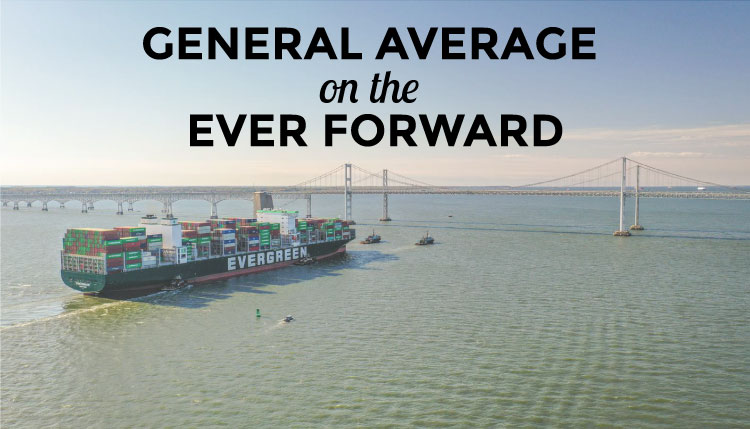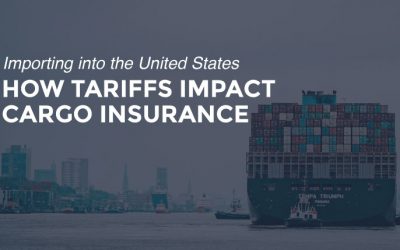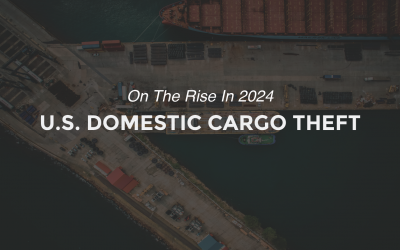The Ever Forward ran aground in the Chesapeake Bay and sat stuck for over 30 days with the rescue operation resulting in the declaration of General Average.
General Average was declared for the containership known as the Ever Forward after it ran aground in the Chesapeake Bay off the coast of Baltimore on March 13, 2022. This declaration came after the company made multiple attempts to re-float the ship, but determined that the rising costs associated with the operation was too much.
The ship departed the Port of Baltimore and was traveling at about 13 knots when it exited the dredged channel and came to a stop in about 25 feet of water. As this ship needs a depth of 42 feet of water to operate, it was left buried in about 15 feet of mud.
Evergreen Marine, the owners of the Ever Forward, made the following statement on March 31st:
“After the incident happened, Evergreen immediately activated its emergency response plan and appointed the salvor Donjon-Smit to conduct underwater inspections and design re-floating plan. The program included dredging around the stranded vessel to increase buoyancy and deploying tugboats for the rescue operation. With the approval by the competent authorities, dredging operation began on March 20. Subsequent to the completion of the initial dredging phase, the rescue team made two attempts to refloat Ever Forward on March 29 and 30. Unfortunately, both attempts proved to be unsuccessful.”
The Re-Floating of the Ever Forward
After two unsuccessful attempts to re-float the Ever Forward, it was decided that cargo containers would need to be removed from the ship in order to lighten the load. This is very similar to the how the MSC Sabrina was re-floated after getting stuck in the St. Lawrence River.
The removal of containers was expected to take about two weeks and involve two crane barges with suitable lifting heights for the operation. The cranes lifted containers from both the port and starboard sides of the ship and placed them on receiving barges. The barges then shuttled the containers back to the Seagirt Marine Terminal in Baltimore where they were offloaded by shore-based cranes. During this process, dredging operation were also continued in order to get to a depth of 42 feet.
Once 500 of the 5,000 individual containers on board were removed, the ship was able to be successfully re-floated on April 17th.
After being re-floated, the Ever Forward made its way back to the Port of Baltimore where it was inspected for any damage. Evergreen Marine made a statement that the vessel sustained no damage and that all equipment is functioning normally. Therefore the 500 removed containers were reloaded onto the Ever Forward and the vessel departed following her normal route to Norfolk and then New York before proceeding to the Panama Canal. She is expected to return to China at the end of May and resume her normal rotation.
The Declaration of General Average
General Average is a maritime all in which all parties in a sea venture proportionally share any losses resulting from a voluntary sacrifice of part of the ship or cargo to save the whole in an emergency. You can learn more about general average in our various blog posts on the topic.
Once General Average was declared on the Ever Forward, Evergreen Marine made the following statement:
“Evergreen Line urges all cargo interests involved, and joint venture slot users to provide security bonds and necessary documents according to the adjusting rules that govern GA in order to take delivery of cargo after the vessel is freed and arrives at its future ports of discharge.”
In this statement, Evergreen Marine is telling importers with cargo onboard the Ever Forward to ensure that they provide security in order to receive their delayed cargo. This is in reference to the fact that an importer that is involved in a General Average event must provide a cash deposit in order for their cargo to be released into their custody.
However, if the importer has an All-Risk Caro Insurance policy in place, the insurance provider will provide an Average Bond. This average bond acts as a guarantee that the importer will pay their contribution to the general average once the average adjuster has determined that amount. The average bond takes the place of that cash deposit so that the importer can claim their cargo without having to place additional money.
Learn more about how a General Average claim is calculated in the following video:
Did you like that video? Subscribe to our YouTube Channel for instant access to the next videos in the GA Series.







